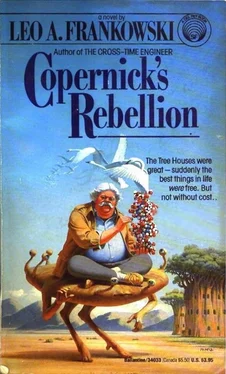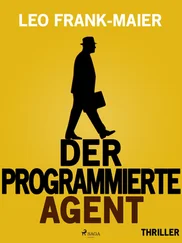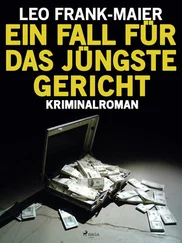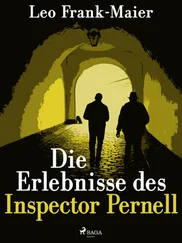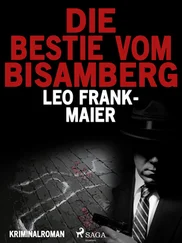“He doesn’t deserve it. Send him back with a compulsion to kill others of his type.”
* * *
Patricia and Mona wandered into a flatter and shadier section of town where most of the tree houses were one—story affairs. Facilities were laid out for the less athletically inclined, with chessboards and trout streams instead of bridle trails and canoe streams. Quite a few older people were around.
“Most of our senior citizens have moved out this way,” Mona said.
“Wouldn’t they want to be nearer the medical center at Pinecroft?” Patricia asked.
“That was the original plan. But when a group of doctors formed a clinic out this way, most of the seniors moved near it. I guess they prefer a human doctor to an LDU.”
“LDUs do take some getting used to,” Patricia said.
“Hi, Mom!”
“Bobby! What are you doing at this end of town?” Mona said.
“There’s a new physics teacher who just moved in. I want to see if he’s any good. Who’s your friend?”
“Patty, this is my son, Bobby. Bobby, Patricia Cambridge. Patricia is staying with Uncle Martin.”
“Pleased to meet you, Patty. I’m glad to see Uncle Martin isn’t living alone anymore.”
“Uh, it’s good to meet you, Bobby.” Patricia tried not to act as flustered as she was. For one thing, Bobby looked fifteen and Mona looked twenty. And Mona was all red hair and freckles while Bobby was pure ebony. But mostly, you don’t tell your son who’s sleeping with whom!
“Ma, why don’t you come over to my house tomorrow afternoon. Ishtar has been talking about you—that’s my faun, Patty—and I want you to meet my new girlfriend.”
“I’d love to, Bobby. About three?”
“Great, Mom. But I’ve got to run. The introductory seminar starts in ten minutes. Bye!”
“Bye, Bobby!” Mona said. “The schools here function something like those of the old Moslem culture. If there is something you’re interested in, you find someone who can teach you whatever it is you want to know. Then you make a private deal with him. You stay with it until you’ve learned all you want. No grades, no diplomas. But it works.”
“He’s very nice, your, uh, son,” Patty said.
“Adopted, of course. How old do you think I am? Bobby was injured on our land, and Heinrich felt pretty bad about it. The doctors in L.A. couldn’t help Bobby, but of course Heinrich could. When we found out that Bobby was an orphan, the easiest thing was to adopt him.
“He stayed with us for a year, mostly to get his bearings, but he’s fifteen now, so he moved into his own tree house a few weeks ago.”
“He moved out at fifteen?”
“Yes. A bit late, of course, but then the lack of a proper home during his formative years slowed him down a bit. He’s doing all right now.”
“But leaving home at fifteen?” Patty said.
“The age of consent around here is puberty, Patty. Uncle Martin feels that if nature says you’re an adult, who are we to argue?”
“I guess so,” Patty said. Life Valley was going to take some getting used to.
Vintovka and his eagle died on the operating tables.
“You know, Heiny. This man didn’t kill Vintovka. His gun did it.”
“Same difference,” Heinrich said. “He pulled the trigger.”
“Yah, he’s guilty. But without weapons, he couldn’t have done any real damage to us,”
“You have an idea, Uncle Martin?”
“I am thinking about my kidney trees, that take metal out of the soil. I think we can do that backward.”
“A metallic fungus?”
“Too slow. I’m thinking maybe little iron mosquitoes whose larvae eat up the iron in guns and tanks. If we take their guns away, they can’t hurt anybody. We can win the war without having to kill people.”
“You’re going to have to brief me on metallic biochemistry, Uncle Martin, but I think we can do it. How about an aluminum eater to kill aircraft?”
“Sure. That’s easier than iron.”
“We’ll have to hit the entire world simultaneously, or we’ll upset the balance of power,” Heinrich said, thinking hard. “I’ll come up with a bird for a vector… You know that this will knock out more than weapons—the world’s economy, especially transportation and communication, will be destroyed.”
“That had to go anyway,” Guibedo said. “We make it happen a couple years early, is all. I’ll do that food tree you wanted to feed people until everybody’s got a tree house.”
“We’d better get on it now, then, Uncle Martin. It’s got to be ready in about three months.”
“I thought you said the war was in six months.”
“Probably. But with this, we’ve got to hit them first. Say two months for forced production. That gives us a month for design time.”
“A month for a bird, a tree, and two mosquitoes? Impossible, Heiny.”
“I can fix it so we don’t have to sleep, and I can have my simulation do a lot of the work. We can do it, but it’s going to be a little rough on your love life.”
“That Patty’s a good girl; she’ll understand,” Guibedo said.
“We’d better keep this to ourselves, Uncle Martin.”
“Yah. We do a lot of that around here.”
The CCU recomputed the human fatalities in the upcoming “peaceful” revolution and came up with 375 million dead. But he was programmed not to speak unless spoken to, so he didn’t mention it. Besides, he was ecstatic with the knowledge that now he wasn’t going to have to die.
Chapter Eight
JUNE 17, 2003
MAJOR GENERAL Hastings walked stiffly into the office of the Chairman of the Joint Chiefs of Staff.
“Good morning, George. Have a chair. What can I do for you?” General Powers said.
“Good morning, sir. A number of strange and possibly interconnected events have been occurring over the last few years that I feel I should bring to your attention.”
“Like what?”
Hastings took a list from his attache case.
“Item one. Despite the fact that the tree houses have directly killed thousands of people and have seriously disrupted the economy of the western world, no single major power—except for United India—has passed regulations concerning them.”
“The same thing could have been said about the automobile a hundred years ago, George. I’m as sorry about your family as I can be, but you must not let that tragedy affect your judgment.”
“Sir, I believe that my judgment is unaffected. May I continue? Item two. Because of the probable economic repercussions, work on rejuvenation was stopped— worldwide—about ten years ago.
“The U.S. Congress contains almost six hundred members. More than half of them are over sixty-five years of age. Yet in the past four years, not one single congressman has died of old age.”
“That seems statistically improbable,” Powers said.
“It’s nearly impossible, sir. But it is a fact. It is also a fact that the members of the British House of Commons aren’t dying of old age, either. Nor are members of the Politburo. Nor the French National Assembly. Nor the Chinese People’s Council.
“But the Grand Council of United India does have people dying of old age.”
“So you are saying that somebody has secretly developed longevity and is using it to bribe our own government? That’s a serious accusation, George. Can you back it up?” Powers asked.
“Yes, sir. I can. The process apparently requires repeated treatments. Thirty-two senators and one hundred fifty-five members of the House visit a single building in Crystal City at different times, but each on a given day of the month. They will reschedule overseas visits, even election rallys, to keep these appointments. And every one of them was previously quite ill but is now quite healthy.”
Читать дальше
